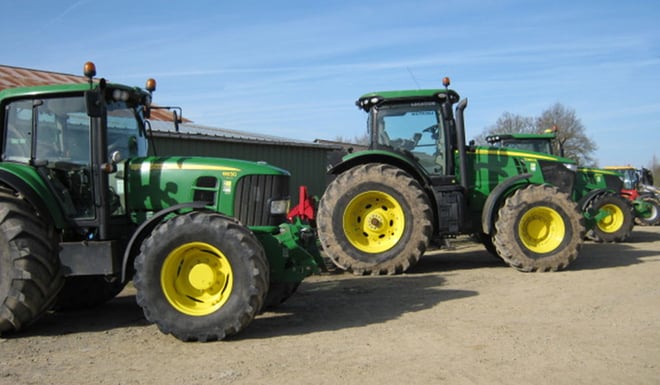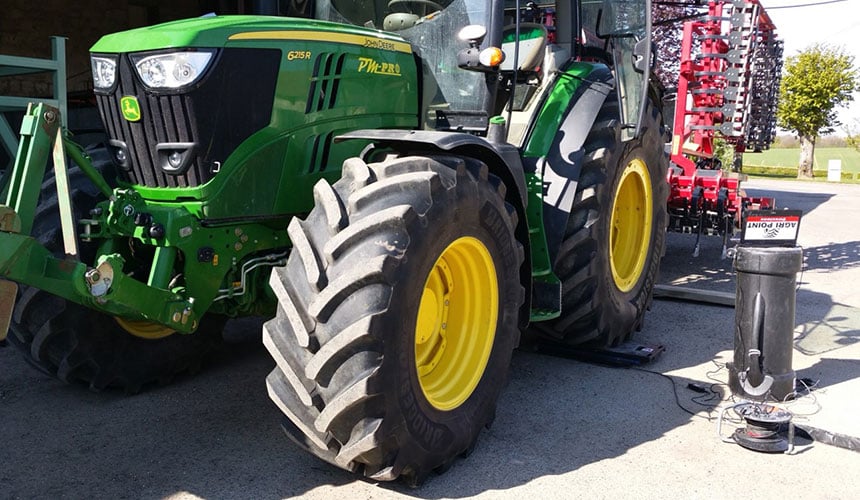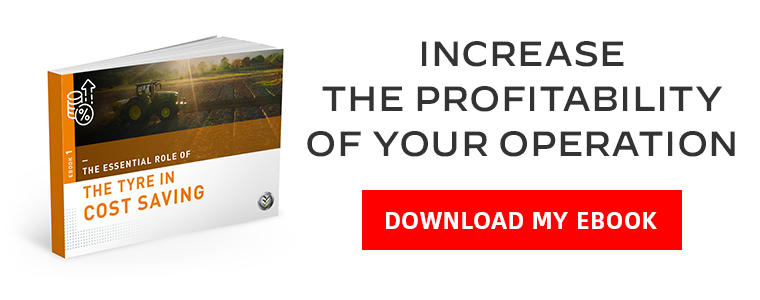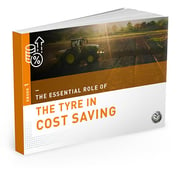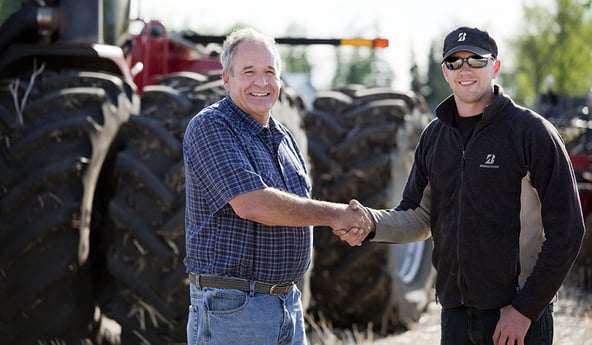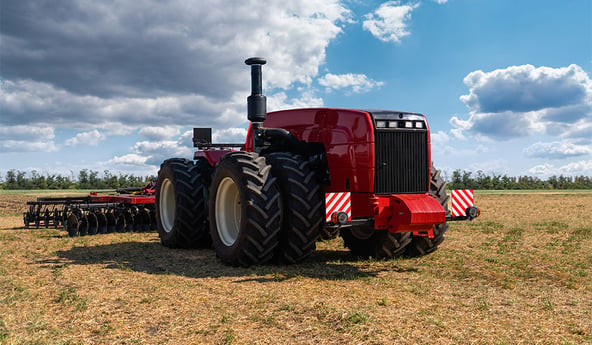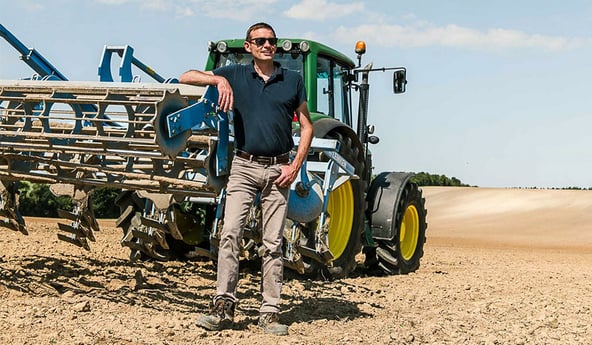The management of agricultural tyre costs cannot be the same for agricultural contracting firms as for farmers, because the number of tyres is much higher, the number of hours’ work for each tractor is much higher and the number of kilometres to drive by road to reach the clients’ farms is incomparable.
An investment in top-of-the-range tyres makes much more sense, even though it is always difficult to pass on the cost of the equipment to the price of the services. Yet with high-tech equipment you work faster and gain more trust from your clients who will then entrust more jobs to you.
Here is how to manage agricultural tyre costs for agricultural contractors and get a better return on investment:
1. Investigations
For agricultural contracting companies, the tyre represents one of the highest costs after fuel, which means that a strategy has be put in place to optimise the return on your investment.
In practice, the strategy of “spending less” is soundly beaten by the “investing better” strategy. Thanks to technological developments, you effectively have much more to gain by having state-of-the-art equipment which allows you to save time with better quality work than by trying to save a few hundred euros on buying second hand equipment or equipment produced in an underdeveloped country with no manufacturing standards or research and development.
These are the key points to bear in mind to make the right choice when replacing worn tyres:
1. Opt for VF tyres to obtain advantages similar to duals
There is nothing better than duals to improve traction while preserving the structure of your soil, yet there are also many disadvantages, such as the cost and the cumbersome size.
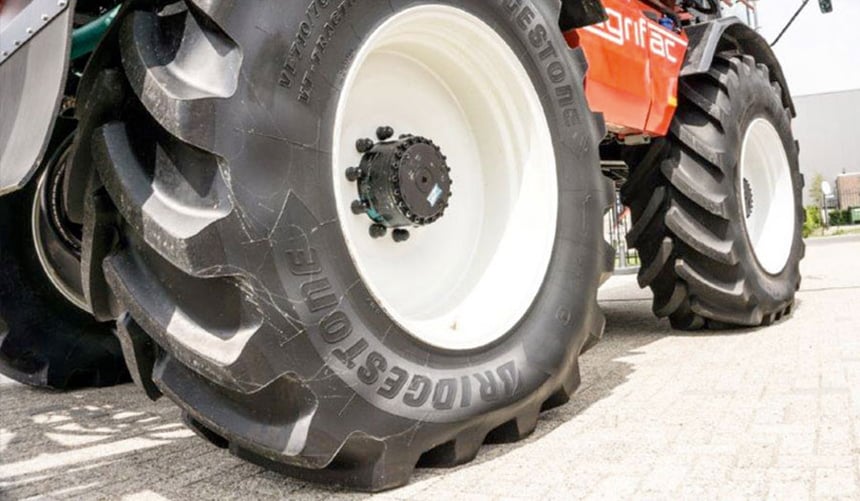 VF tyres: VT-Tractor
VF tyres: VT-Tractor
Thanks to their more high-tech design, you no longer need to adjust inflation pressure between field and road, which means that you save time between the different plots of land.
2. Choose IF and VF CFO harvesting tyresO
IF and VF technology CFO harvesting tyres are designed to manage cyclical loads, i.e. to work with a variable load since the hopper is repeatedly filled and emptied throughout the harvesting operation, adding between 8,000 and 12,000 kilos every time it is filled.
They either offer you a bonus load or let you work without compacting your soil at 2.4 bars while maintaining a speed of 15 km/hour.
3. Choose tyres that are resistant to wear with a higher volume of rubber
Wear is the main reason for replacing agricultural tyres. For agricultural contracting companies which have to travel long distances on the road to reach their clients’ fields, this wear is accelerated by the road surface which is much harder and more abrasive than soil.
2. Investment to optimise your agricultural tyres
1. Opt for bigger tyres
The objective of bigger tyres with a higher volume of air is clearly economic. You certainly know that your tractor’s original tyre is not the best for your farm, but an average solution to suit everyone (tyre size not adapted to the load or basic technology).
LReplacing your tyres is therefore an opportunity to get the most from your machine. The bigger the tyre, the more you transmit power to the ground, reduce slippage and therefore improve traction and reduce working time as well as fuel consumption.
2. Remote inflation: ideal for getting inflation pressure right
The principle of remote inflation is easy to understand: it allows you to adjust tyre pressure while driving to improve tyre performance, preserve tyre lifespan and reduce compaction caused by agricultural machinery.
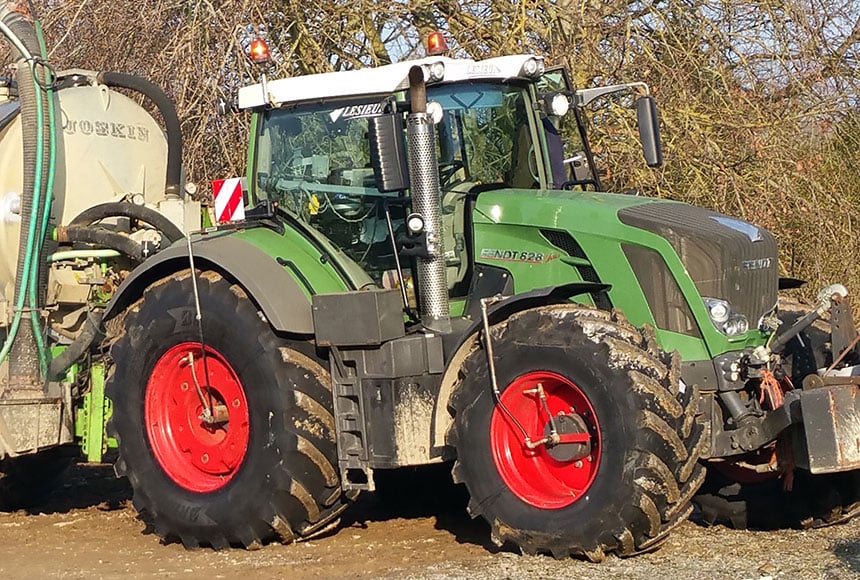 Remote inflation system
Remote inflation system
For agricultural contracting companies, having a remote inflation system is a guarantee that all your operators will adapt inflation pressure correctly, because it does not require any time or effort. Your teams will systematically be able to work in the fields at a pressure of 0.8 bar and increase pressure when driving on the road without having to stop.
This is a good sales argument for your clients, many studies have shown that the loss of yield as a result of compaction can represent up to 20% (even as much as 50% depending on the crop and the extent of the compaction). This is even more pertinent if the work is carried out in wet conditions, such as harvesting work in the Autumn (corn and sunflower) and also during stubble ploughing and preparation (tilling and sowing).
3. Use of agricultural tyres
The lifespan of your agricultural tyres can either be reduced by 50% or increased by 20% depending on how they are used:
- distance on the road,
- type of soil,
- type of operations…
Eco-driving
Ensuring that all the agricultural contractor firm employees systematically adopt eco-driving habits would represent thousands of euros in savings at the end of the year.
There are numerous advantages to reducing speed on the road, the principal benefit being a reduction in tyre wear. The higher the speed, the more the rubber heats up, with temperatures rising to up to 65° within the tyre if you drive too fast with an excess load.
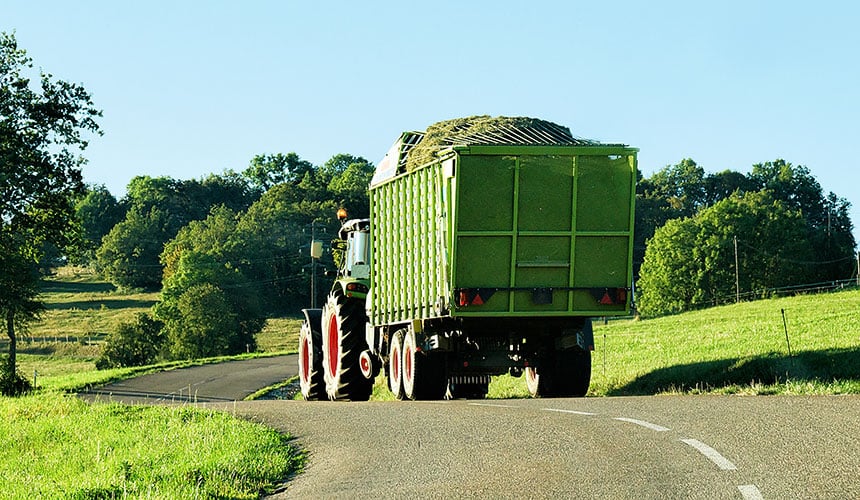 Agricultural tractor eco-driving
Agricultural tractor eco-driving
The time saved each trip is minimal when you drive at the authorised speed limit, but the wear on the rubber is very marked.
Control loads and adapt pressure
It’s easy to make the decision to fill a trailer to the brim to save a trip during harvesting operations. This is a legitimate choice, though not without consequences, especially for an agricultural contractor firm which will have a longer trip by road due to the distance necessary to reach the fields.
Adjusting tyre pressure to correspond precisely to you load is always better than ruining a set of tyres, even if you are pushed for time.
If you put too much strain on your tyre, its internal structure may deteriorate rapidly, which could halve its lifespan.
Using VF tyres with extensive flexion capacity means that you can increase the load by 40% without any physical consequences, because this type of tyre is designed with high-tech casing that can handle more deflection and is therefore much more resistant than standard tyres.
4. Maintenance of agricultural tyres
Inspection routines
Taking a few minutes before beginning each operation to carry out the necessary checks must be part of the routine and in the long-term will always be profitable. Just like a pilot with his checklist of systematic procedures, with the aim of avoiding errors and accidents, you can follow a minor inspection routine to ensure that your equipment is fully operational before each campaign:
- Inspection of the trailer attachment: coupling pins, axles, hitch pins, cables, electric cables…
- Inspection of levels: oil, fuel…
- Functioning of lights, warning light and indicators
- Presence of crankcases and protections
- Visual inspection of tyres and rims
- Load check
- Inflation pressure adjustment
Maintenance periods depending on the activity
Your tyres face different types of strain which depend on the activity you are going to carry out. For example: for soil preparation work you need to reduce inflation pressure, whereas the harvesting period requires higher pressure to cope with the load and spend more time on the road. This is why maintenance periods must follow your activity and not be carried out systematically at the same time of the year, during the dead season.
Below are the best adapted maintenance periods based on your tractor activity:
Agricultural tyre maintenance table
| Jan. | Feb. | March | April | May | June | July | Aug. | Sept. | Oct. | Nov. | Dec. | |
|---|---|---|---|---|---|---|---|---|---|---|---|---|
| Ploughing | ||||||||||||
| Sowing | ||||||||||||
| Spraying/spreading | ||||||||||||
| Crop protection | ||||||||||||
| Haymaking | ||||||||||||
| Harvest (wheat, barely, rapeseed, corn, sunflower) | ||||||||||||
| Cereal transport | ||||||||||||
| Potato harvesting | ||||||||||||
| Corn silage | ||||||||||||
| Beet harvesting | ||||||||||||
| Beet transport | ||||||||||||
| Chicory harvesting |
Identification of loads (weight)
Inflation pressure control
Wheel inspection (metal parts + tyre)
Mechanical inspection
The Bridgestone-agriculture.eu blog is written and administered by tractor tyre experts who are available to provide you with the advice you need on the subject of your agricultural tyres. They allow you to maximise your productivity with information on all subjects linked to tyres: Technical data for agricultural tyres – Agricultural tyre performance – Air pressure advice, Solutions to avoid soil compaction – Sprayer tyre pressure – Why and how to ballast your tractor tyres – etc….
To take it one step further and increase the profitability of your farm, les Experts du pneu provide a free, highly detailed eBook which explains the essential role of the agricultural tyre in your productivity.
Most people who read this article have also read some of the following articles which are listed by order of popularity:
- Buying guide: 10 important tips for choosing the right farming tyres
- 4000 euros in savings per year by chosing a better agricultural tyre
- How to choose tyres for my farm trailer before the harvest?
- Standard farming tyre or forestry tractor tyre for deforestation?
- Which is better value? A cheap agricultural tyre or a VF tractor tyre
- Here’s how your agricultural tyres can save you money
- How to make the right choice for your agricultural or tractor tyres?
- Increase the yield of your sprayer with narrow VF tyres
- Do you know which are the best agricultural tyres for your sprayer?
- A good agricultural tyre is the best guarantee of sprayer stability
- What is the best tyre for my combine harvester, IF, VF or CFO?
- A hi-tech agricultural tyre to save time during your harvest
- The top 5 reasons for choosing VF agricultural tyres
- The VF agricultural tyre: VF technology increases your productivity
- Cheap agricultural tyres, discount agricultural tyres, is it worth it?
This information is intended only to make you aware of the technical and functional aspects of agricultural tires and their use. It does not allow you to make a judgment or a definitive conclusion on a given problem. Only your agricultural tire expert is able to make a technical assessment and take a final decision, case by case.
Leave a
commentary
Your email address will not be published.
Required fields are indicated with *


